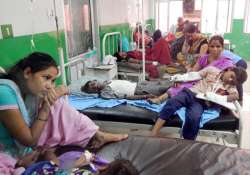Five more chikungunya deaths in Delhi’s Apollo, toll mounts to 10
Two more chikungunya deaths have been reported in New Delhi, taking the number of fatalities to seven. According to reports, both of them were men and died of complications related to the disease at the Indraprastha Apollo Hospitals.

Five more chikungunya deaths have been reported in New Delhi, taking the number of fatalities to 10. According to reports, the five deaths were reported from the Indraprastha Apollo Hospital.
Ganga Ram Hospital has reported four chikungunya deaths since September 13, while Bara Hindu Rao Hospital recorded its first death on September 1. The deaths in Apollo took place over the past three weeks.
"We have had five deaths in the past three weeks of patients with chikungunya fever, most of whom were elderly and had associated co-morbid disease conditions and complications like chronic kidney disease, coronary artery disease, which affect the course of recovery," said a statement from Apollo hospital.
An 80-year-old patient named Mahendra Singh was the last to die at Indraprastha Apollo. Singh died due to multi organ failure triggered by chikungunya.
"The patient had multi-organ failure triggered by chikungunya and died on September 13 evening," a senior official of the hospital said.
The hospital is managing patients with fever, including chikungunya and dengue, as per prescribed guidelines, said the hospital.
Delhi so far has witnessed the death of 10 patients, who were suffering from chikungunya along with other health ailments also.
Medical Science says that nobody categorically dies of chikungunya, but if the patient is suffering from some other health issue, it may get aggravated, leading to death.
Union Health Minister JP Nadda today said that there was no need to panic over the surging cases of chikungunya and dengue, and sought the people's support in stopping the breeding of mosquitoes.
"There is no need to panic. Everywhere, and especially in Delhi, we need people to cooperate. Breeding of mosquitoes should be stopped. Every family must pitch in as the breeding centres are at homes. We need to check that there is no water logging,” Nadda said.
Nadda said that he spoke to Delhi Health Minister Satyendra Jain yesterday regarding the crisis and Delhi government assured him that they had all required resources to deal with the situation.
“I talked to Satyendra Jain as well... He said they have all resources and are working according to the guidelines of central government,” Nadda said.
Yesterday, the Sir Ganga Ram Hospital said that it had recently found that the chikungunya virus has a tendency not to show itself in the chikungunya Igm serology test while it shows up during the RT-PCR test only, which the hospital has been using for the suspected samples.
Currently, many of the hospitals in Delhi have been performing the Igm serology test, which is probably the reason why a lot of hospitals have not been able to confirm the presence of disease.
“This particular virus of chikungunya has a tendency not to show itself in chikungunya in the Igm serology test. In fact, in the last 10 days, we applied chikungunya Igm serology test in 385 samples and none of them were positive whereas when we applied RT-PCR in 524 samples, a total of 293 samples came positive," said Chand Wattal, Chairman of the Microbiology department at Sir Ganga Ram Hospital.
The RT-PCR test is being used by a very few hospitals currently in the national capital